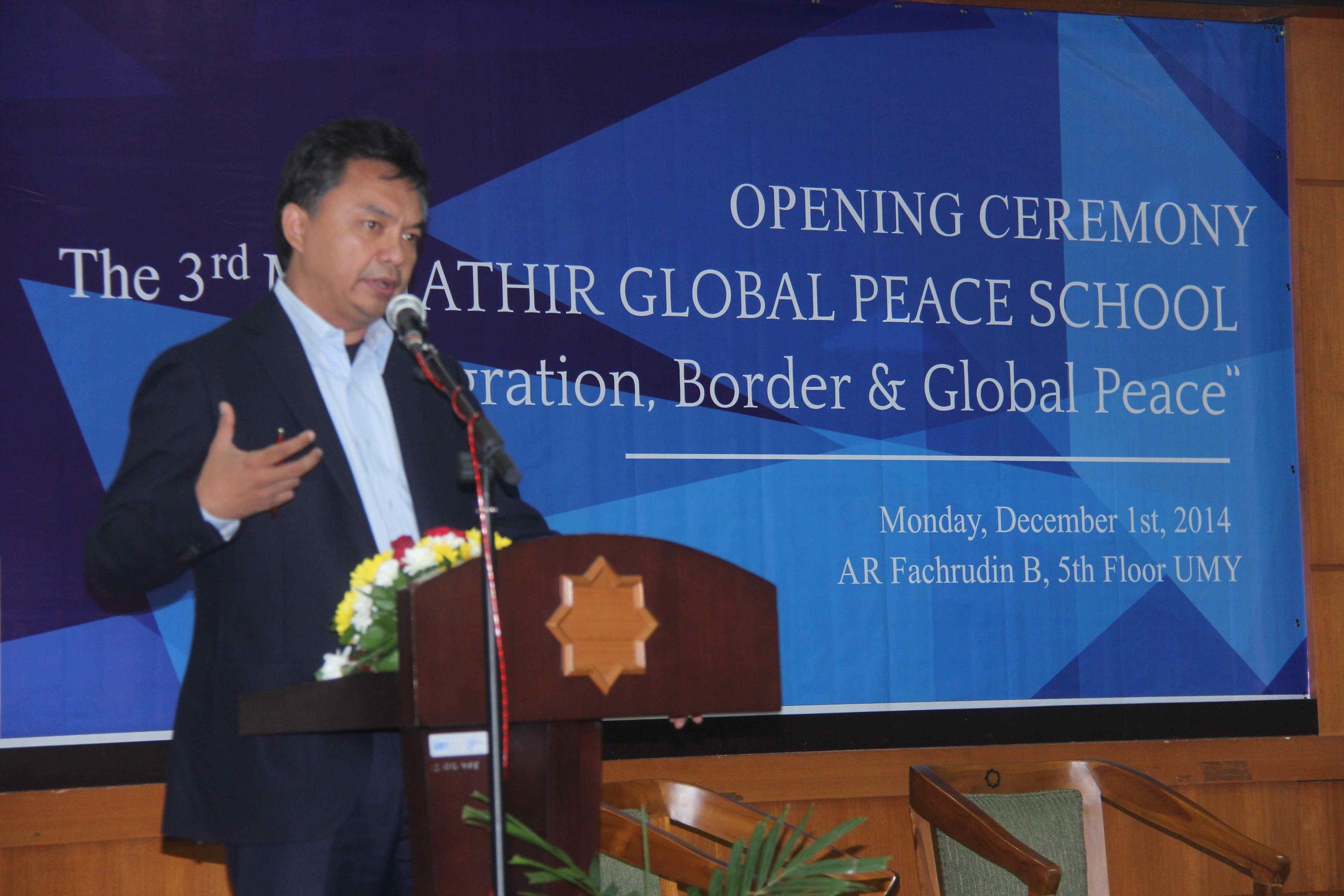
The peace issue is still a hot issue to discuss among many groups of people, not only the ones of peace observers but also academicians. Nevertheless, an effort of resolving conflict among warring states or groups occasionally does not have certain attention from the local government. For Instance, in Indonesia itself, either local or central government does not have any detail note or document regarding conflict resolution or local wisdom as a lesson to cope with similar conflict one day. It should be a focus of government officials to consider local wisdom in every state or area as one of the attempts to resolve conflict.
It was stated by Dr. Dino Patti Djalal, a former Deputy Minister of Foreign Affairs of Indonesia, as a keynote speaker in Opening Ceremony of the third Mahatir Global Peace School (MGPS) “Interstate Relation and Global Justice for Peace and Conflict Resolution”, taking place at meeting room of A.R. Fachruddin B floor 5 UMY. This event conducted on cooperation between Universitas Muhammadiyah Yogyakarta (UMY) and Global Peace Foundation (PGPF) would be carried out for 10 days, from Monday (1/12) to Wednesday (10/12).
In his explanation, Dino also uttered that Indonesia as a rich country of local wisdom should be able to employ it to conflict resolution. He argued that local wisdom contained policies of all life aspects including resolving conflict. “Indonesia should engage this local wisdom as an instrument to conflict resolution. However, it is unfortunately that this local wisdom from all parts of this country is not documented well. Indonesia has much local wisdom, yet does not have index or categories for the local wisdom as one of the references in establishing harmony among individuals and groups,” he expounded.
Hence, MGPS was for, according to Dino, one of the ways for Indonesia or other countries to incessantly explore any efforts of conflict resolution in their country. Moreover, the eagerness to coin peace in the world, all states should acknowledge diversity of social, tradition, culture, and religion in other countries. This founder of Foreign Policy Community of Indonesia (FPCI) also conveyed that globalization faced by all states should be confronted open and positive-mindedly. “Globalization era nowadays should be noticed as an occasion. We have a lot of chance in this era to take part in this international world including the effort to create peace,” he said.
Besides Dino Patti Djalal, the other speakers who contributed ideas to find conflict resolution in the world were Prof. Johan Galtung (Transcend), Tan Sri Dato’ Seri Utama Dr. Rais Yatim (PGPF), Andrew James Bartles-Smith (ICRC), Emma Leslie (Center for Peace and Conflict Studies, Cambodia), Prof. Tulus Warsito (Universitas Muhammadiyah Yogyakarta), Prof. Alberto Gomes (DEEP La Trobe University-Australia), Tan Sri Gen. (Rtd.) Mohd. Azumi (PGPF-Malaysia), Dr. Maung Zarni (LSE-London), Prof. Purwo Santoso (Gadjah Mada University), Dr. Martino Sardi (PSPH-UMY). Together with the opening ceremony of MGPS on the 1st of December 2014, it would also be held an official announcement of Center of Peace and Humanitarian Studies (PSPH UMY) and Soft-launching a book of Global Peace for Justice and Humanity that Dr. Hilman Latief was as co-editor. Whereas, participants of the third MGPS were from twelve countries which were Germany, Australia, Thailand, Kenya, Cambodia, China, the Philippines, Sudan, Palestine, Turkey, Malaysia, and Indonesia.







